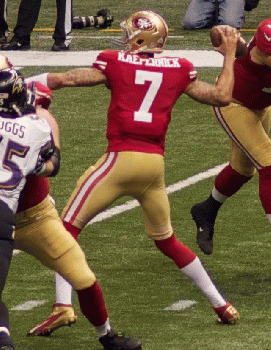
Colin Kaepernick (cropped)
(Image by (From Wikimedia) Au Kirk; cropped by Moe Epsilon, Author: Au Kirk; cropped by Moe Epsilon) Details Source DMCA
"The spectacle is the nightmare of imprisoned modern society which ultimately expresses nothing more than its desire to sleep. The spectacle is the guardian of sleep."
Guy Debord, The Society of the Spectacle
It is generally accepted that sports, especially spectator sports, serve many social purposes, good and bad, and that they function to distract people from the cares and worries of everyday life, or the "real world." No doubt this is true. The etymology of the word sport, derived as it is from the word "disport" -- divert, amuse, carry away -- tells us that. But often a distraction can also be a reminder, even when that reminder remains shrouded in unconsciousness or forgotten in the moment. Sometimes, however, the reminder can be linked to memories that bring a startling clarity to the present.
Two recent sports news items have reminded me of incidents from my own athletic past. And those memories in turn have brought my reflections back to the current news regarding the failure of any National Football League (NFL) team to sign quarterback Colin Kaepernick to a contract, and the recent boxing match between Floyd Mayweather and Conor McGregor.
Kaepernick's case is well-known and much discussed. He took a valiant and principled stand last football season by taking a knee during the national anthem to protest the violent treatment of black Americans by the police and American society in general. History was on his side, unless one was a clear-cut white racist and ignorant of American history. But as a terrific football player and a well-known athlete, his stand was unusual in the world of sports where political protest is very rare and not being reminded of the "real" world is the key to success. The NFL, in particular, is a very conservative organization, long infused with a super patriotic ethos wrapped in the American flag and the song that celebrates it, and Kaepernick's protest was a diversion from the diverting spectacle on the field and not welcomed by NFL owners, to put it mildly.
So as of this writing, Kaepernick, a very good football player who would clearly strengthen an NFL team, remains without a job. That this is because he lacks talent is ridiculous. While pressure against the NFL from multiple media and organizational sources is growing to reverse this situation, even well-meaning writers have implicitly used racist language to describe the situation by saying that Kaepernick is being blackballed. Ironic as it is, our language is filled with such subtle reminders of the white mindset that equates white with good and black with bad.
But there is a deeper irony involved, and language once again reveals it.
First, however, let me briefly tell you of my memories, not because the details are important in themselves, but because they are examples of how we bring to our present perspectives past experiences that can both help to clarify and obfuscate current events. The saying "where you're coming from" contains truth; our past experiences deeply influence how we see the present.
When I was 19-20 years old, a senior in high school and a Division I college freshman on an athletic scholarship, I was involved in two incidents involving sports and violence. The sport was basketball, not football or boxing, and the violence was minimal, but both are etched in my memory. As a young man, I was rarely involved in fighting, but when I felt abused and disrespected, my Irish temper got the best of me and I would physically defend myself. Otherwise, I was a normal young athlete, fueled by the competitive nature of high-level sports and testosterone. But these incidents taught me that the propensity for violence is in us all, and that certain situations and social arrangements can inflame and promote it, especially when you are most unaware and naà �ve.
But what do these memories have to do with the news about Kaepernick and Mayweather/ McGregor? What I saw in both sports stories was violence; one quite obvious with boxing, the other involving Kaepernick, less so.
I realized that violence has many faces, whether it be minor or major, fisticuffs or "blitzes," face-to-face or helmet-to-helmet, physical or verbal, racial or political, institutional or personal, etc. It's largest and most savage one is war, and endless war and preparations for war are the large canvas within which the others lie. Sometimes remembering one's individual inclinations toward violence can help one see the larger picture.
As usual, the Unites States is currently waging multiple wars, and is fomenting many others, including a nuclear one. Most of the victims of U.S. violence are considered "other," the expendable people, as were slaves, Native Americans, and other people of color. Nothing has changed since that other heroic black American dissenter said that America is "the greatest purveyor of violence on earth." And we know that Martin Luther King was murdered by those violent U.S. government forces he criticized in his opposition to war, racial inequality, and economic injustice for all Americans.
I am not equating Kaepernick with MLK, but his protest follows in the King tradition and that of other black athletes who have taken political stands: Mohammed Ali, Tommy Smith, John Carlos, et al. All suffered for their courageous positions.
Of course, Colin Kaepernick has a right to play football, just as Ali had the right to beat people up in the ring. Yet boxing, despite the Mayweather/ McGregor extravaganza, has generally been recognized for the brutal "sport" it is, and has grown less popular over the years, perhaps in part because of Ali's "pugilistic brain syndrome." Not football. It has grown to become America's number one sport, despite the growing evidence of what may be called "football brain syndrome," and all the violence and other crippling injuries suffered by former players, revealed as far back as 1970 when Dave Meggyesy, a former NFL linebacker, published Out of Their League , his expose of the dehumanizing aspects of football.
(Note: You can view every article as one long page if you sign up as an Advocate Member, or higher).





